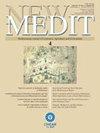Community supported agriculture as a domain of economic exchange: models, social capital and performance of three community supported agriculture groups in Turkey
IF 1.2
4区 经济学
Q3 AGRICULTURAL ECONOMICS & POLICY
引用次数: 1
Abstract
Community supported agriculture (CSA), an innovative food distribution model that encourages environ-mentally sound agricultural production, has been embraced in Turkey since the early 2000s. Although the model has been widely studied within the framework of ethical consumption, environmentalism and social justice, its perspectives as a domain of economic exchange in Turkey has yet to be explored. The present study attempts to investigate the viability of CSAs in Turkey as domains of economic exchange by looking at the interaction between their performance and their main resource, namely their social capital. Following an exploratory approach, we, first, examined the characteristics of the operational, organizational and sup-port models to determine the performance factors indispensable for CSAs in Turkey to survive as domains of economic exchange. We then expanded this understanding by looking into the relationship between these performance factors and social capital indicators of three CSAs in Turkey. The findings reveal that each CSA adopts different support, operational and organizational models that result in different levels of risk shar-ing. In all three CSAs, the character of the social capital that interacts with the performance indicators is bonding rather than bridging. Therefore, investing in bridging social capital can be a potentially beneficial strategy for CSAs in order to become more sustainable as domains of economic exchange.社区支持农业作为经济交流的一个领域:土耳其三个社区支持农业团体的模式、社会资本和绩效
社区支持农业(CSA)是一种创新的粮食分配模式,鼓励无害环境的农业生产,自21世纪初以来一直在土耳其推广。虽然该模式在道德消费、环境保护主义和社会正义的框架内得到了广泛的研究,但其作为土耳其经济交流领域的观点尚未得到探讨。本研究试图通过观察csa的绩效与其主要资源(即社会资本)之间的相互作用,来调查土耳其csa作为经济交换领域的可行性。采用探索性方法,我们首先检查了业务、组织和支持模型的特征,以确定土耳其csa作为经济交换领域生存所不可或缺的绩效因素。然后,我们通过研究这些绩效因素与土耳其三个csa的社会资本指标之间的关系来扩展这一理解。研究结果表明,每个CSA采用不同的支持、运营和组织模式,导致不同的风险分担水平。在所有三个csa中,与绩效指标相互作用的社会资本的特征是结合而不是桥接。因此,投资于桥接社会资本可能是一种潜在的有益战略,以使csa成为更可持续的经济交换领域。
本文章由计算机程序翻译,如有差异,请以英文原文为准。
求助全文
约1分钟内获得全文
求助全文
来源期刊

New Medit
AGRICULTURE, MULTIDISCIPLINARY-
CiteScore
2.00
自引率
30.00%
发文量
31
审稿时长
>12 weeks
期刊介绍:
New Medit is an applied economics journal, with a multidisciplinary approach, aimed at providing insights into the economic and the social transformations of agro-food sector, rural societies as well as local development and bioeconomy in the Mediterranean Basin.
Manuscripts submitted to NEW MEDIT generally should deal with wide-ranging topics that can be extended to other countries where organisational, production and market conditions and the related development policies may emerge at the corporate or regional level.
 求助内容:
求助内容: 应助结果提醒方式:
应助结果提醒方式:


